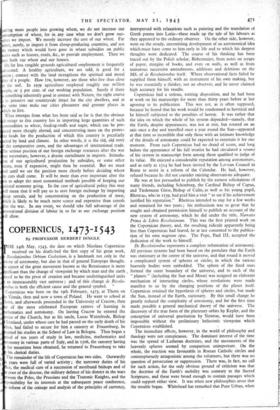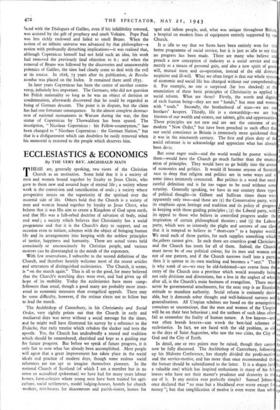COPERNICUS, 1473-1543
By PROFESSOR HERBERT DINGLE
HE z4th May, 1543, the date on which Nicolaus Copernicus received on his death-bed the first copy of his great work, Revolutionibus Orbium Coelestium, is a landmark not only in the story of astronomy, but also in that of general European thought.
e of the most celebrated European centres of learning in hematics and astronomy. On leaving Cracow he entered the vice of the Church, but as his uncle, Lucas Watzelrode, Bishop Ermland, under whose care he had passed on the early death of his Cher, had failed to secure for him a canonry at Frauenburg, he urned his studies at the School of Law in Bologna. Thus began a nod of ten years of study in law, medicine, mathematics and tronomy in various parts of Italy, and in 5506, the canonry having the meantime been obtained, he returned to Frauenburg to take his clerical duties.
The remainder of the life of Copernicus has two sides. Outwardly years were full of varied activity ; the narrower duties of his ce, the medical care of a succession of moribund bishops and of e poor of the diocese, the military defence of his district in the wars tween the Poles, the Prussians and the Teutonic Knights, and the oonsibility for its interests at the subsequent peace conference, e reform of the coinage and analysis of the principles of currency, interspersed with relaxations such as painting and the translation of Greek poems into Latin—these made up the tale of his labours as they appeared to the ordinary observer. On the other side, however, went on the steady, unremitting development of an astronomical idea which must have come to him early in life and to which his deepest thoughts were dedicated. The course of his thinking has been traced out by the Polish scholar, Birkenmajer, from notes on scraps of paper, margins of books, and even on walls, as well as from numerous successive amendments, additions and deletions on the MS. of de Revolutionibus itself. Where observational facts failed he supplied them himself, with an instrument of his own making, but he was essentially a thinker, not an observer, and he never claimed high accuracy for his results.
Copernicus had a serious, retiring disposition, and he had been at work on his manuscript for more than thirty years before at last agreeing to its publication. This was not, as is often supposed, because he feared that his work would be condemned as heretical and he himself subjected to the penalties of heresy. It was rather that the idea on which the whole of his system depended—namely, that the Earth, despite appearances, was not at rest, but rotated on an axis once a day and travelled once a year round the Sun—appeared at that time so incredible that only those with an intimate knowledge of the details of astronomy could be expected to entertain it for one moment. From such Copernicus had no dread of scorn, and long before the appearance of his full treatise he had circulated a résumé of his system in manuscript form among those qualified to judge of its value. He enjoyed a considerable reputation among astronomers, and as early as 1514 he had been invited by the Lateran Council in Rome to assist in a reform of the Calendar. He had, however, refused because he did not consider existing observations adequate.
He was at last persuaded to publish by the earnest solicitations of many friends, including Schonberg, the Cardinal Bishop of Capua, and Tiedemann Giese, Bishop of Culm, as well as his young pupil, Rheticus, who in 1539, had paid him a visit " to see if his achievement justified his reputation." Rheticus intended to stay for a few weeks and remained for two years ; his enthusiasm was so great that he sought and obtained permission himself to publish an account of the new system of astronomy, which he did under the title, N'arratio Prima de Libris Revolutionum. This was the first printed work on the Copernican .theory, and, the resulting ridicule apparently being less than Copernicus had feared, he at last consented to the publica- tion of his own magnum opus. The Pope, Paul III, accepted the dedication of the work to himself.
De Revolutionibus represents a complete reformation of astronomy. All previous systems had been based on the postulate that the Earth was stationary at the centre of the universe, and that round it moved a complicated system of spheres or circles, in which the various heavenly bodies were embedded. The sphere of the fixed stars formed the outer boundary of the universe, and to each of the " planets " (including the Sun and Moon) was assigned an elaborate mechanism of interacting circles, whose revolutions were made manifest to us by the changing positions of the planet itself. Copernicus retained the hypothesis of spheres and circles, but made the Sun, instead of the Earth, stationary. By this small change he greatly reduced the complexity of astronomy, and for the first time made_ possible a general mechanical theory of the universe. The discovery of the true form of the planetary orbits by Kepler, and the conception of universal gravitation by Newton, would have been impossible without the preliminary heliostatic viewpoint which Copernicus established.
The immediate effects, however, in the world of philosophy and theology were not conspicuous. The dominant interest of the time was the spread of Lutheran doctrines, and the movements of the heavenly spheres seemed by comparison unimportant. On the whole, the reaction was favourable in Roman Catholic circles and contemptuously antagonistic among the reformers, but there was no question of persecution or suppression. There was, in fact, no call for such action, for the only obvious ground of criticism was that the doctrine of the Earth's mobility was contrary to the Sacred Scriptures, and these were broad enough to contain passages which could support either view. It was when new philosophies arose that the trouble began. Whitehead has remarked that Pope Urban, when faced with the Dialogues of Galileo, even if his infallibility tottered, was assisted by the gift of prophecy and smelt Voltaire. Pope Paul was less richly endowed and failed to smell Bruno. When the notion of an infinite universe was advanced by that philosopher—a notion with profoundly disturbing implications—it was realised that, although Copernicus himself had not held such an idea, his work had removed the previously fatal objection to it ; and when the removal of Bruno was followed by the discoveries and unanswerable polemics of Galileo, the time had clearly come to deal with the evil at its source. In 1616, 73 years after its publication, de Revolu- tionibus was placed on the Index. It remained there until 1835.
In.later years Copernicus has been the centre of another contro- versy, infinitely less important. The Germans, who did not question his Polish nationality so long as he was an object of derision or condemnation, afterwards discovered that he could be regarded as being of German descent. The point is in dispute, but the claim has had one fortunate consequence. In the almost complete destruc- tion of national monuments in Warsaw during the war, the fine statue of Copernicus by Thorwaldsen has been spared. The inscription, " Nicolaus Copernicus : his FelloW-countrymen," has- been changed to " Nicolaus Copernicus : the German Nation," but that is a disfigurement which can doubtless be easily removed when his memorial is restored to the people which deserves him.



























 Previous page
Previous page